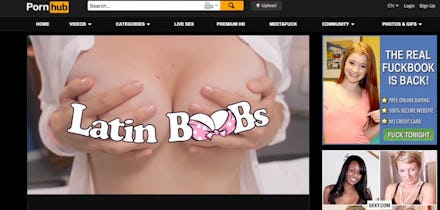This Fake Porno Will Trick You Into Learning About Breast Cancer

What if you thought you were watching porn and all of a sudden the image fizzled into a public service announcement? Would you be engaged or just pissed off?
That's what the Alcázar Gynecology Institute was trying to figure out with a new bait-and-switch ad that teaches men how to check for lumps in their partner's breasts. The AGI hired one of the world's largest advertising firms, DDB, to design the fake porno to be uploaded to PornHub, the world's third biggest porn website with 18.35 billion visitors and 78.9 billion videos viewed in 2014.
The video starts off with a common porn trope: a woman fondling herself in a massage parlor until a masseur begins helping her out with oiled-up hands. This sensual exercise lasts approximately 37 seconds before the video reveals itself to actually be a public service announcement.
(Warning: Ironically NSFW)
The video was originally launched in October 2014 to coincide with breast cancer awareness month and was uploaded on what appears to be an official DDB Vimeo account on Monday. It may seem like an unconventional way to promote awareness, but people are paying attention.
A boob job well done? AGI is trying this new approach to breast cancer awareness as current advertising targeted at women doesn't seem to be that impactful. But since this is the first time such an ad has been targeted at men, it remains to be seen if this is an effective method.
This wasn't the only creative DDB breast cancer awareness advertising in 2014. They also turned common social media symbols into hands, encouraging people to self-check for lumps.
There's nothing sexy about breast cancer. While innovative approaches to PSAs are necessary to garner attention, many in the breast cancer community are angered by the sexualization of the disease.
When Tao Las Vegas held a "Save 2nd Base" fundraiser in September 2012, with a poster featuring a bikini model and the words "everyone in pink bathing suits receives open bar," the Susan G. Komen Foundation, a prominent breast cancer awareness foundation, refused to accept the money raised. "We would never have approved that," Komen spokeswoman Andrea Rader told USA Today.
Everyday Feminism argues that ads that sexualize breast cancer awareness are actually oppressive and unhelpful. The focus is on breasts instead of the patients, and ultimately objectifies the subjects while painting an unrealistic picture of the situation at hand.
"Cancer is chronic pain, hair loss, fear and sometimes death," Everyday Feminism notes. "Women smiling, laughing, holding their unscarred breasts suggestively are really unrepresentative of cancer."
Given how traumatic and heart-wrenching the disease can be, perhaps people would be wise to handle the subject with more sensitivity. Yes, sex is an easy sell, but that doesn't mean it's always the best way to advertise something. Female objectification remains a larger problem, so sexualizing breast cancer awareness both disparages women and trivializes the disease.